2021年外研版英语一轮复习课件-七年级下册 Modules 9~12 (26张PPT)
文档属性
| 名称 | 2021年外研版英语一轮复习课件-七年级下册 Modules 9~12 (26张PPT) | 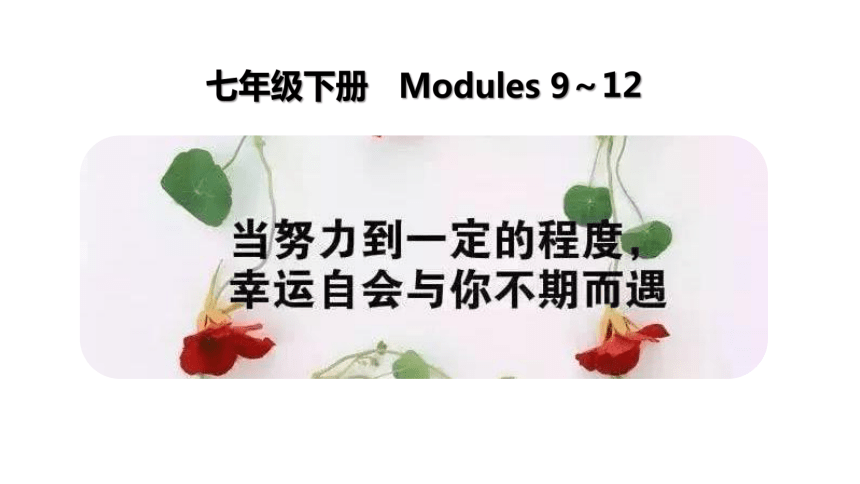 | |
| 格式 | pptx | ||
| 文件大小 | 1.2MB | ||
| 资源类型 | 教案 | ||
| 版本资源 | 外研版 | ||
| 科目 | 英语 | ||
| 更新时间 | 2021-04-27 21:14:37 | ||
图片预览

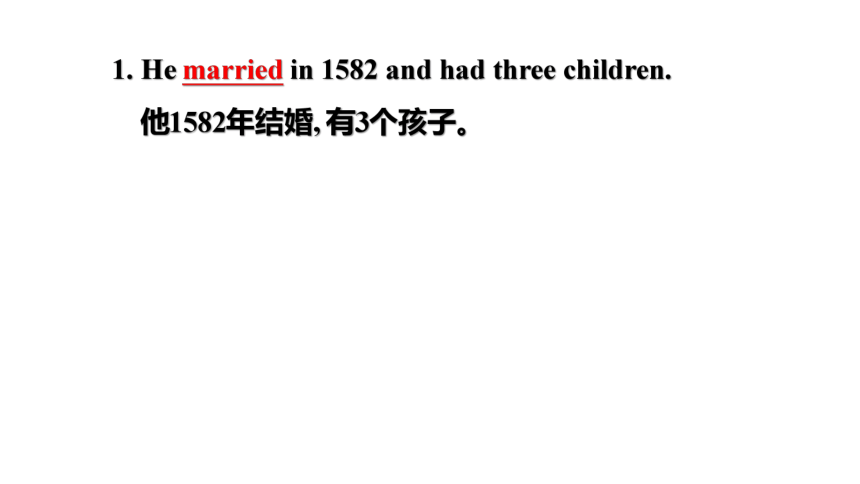
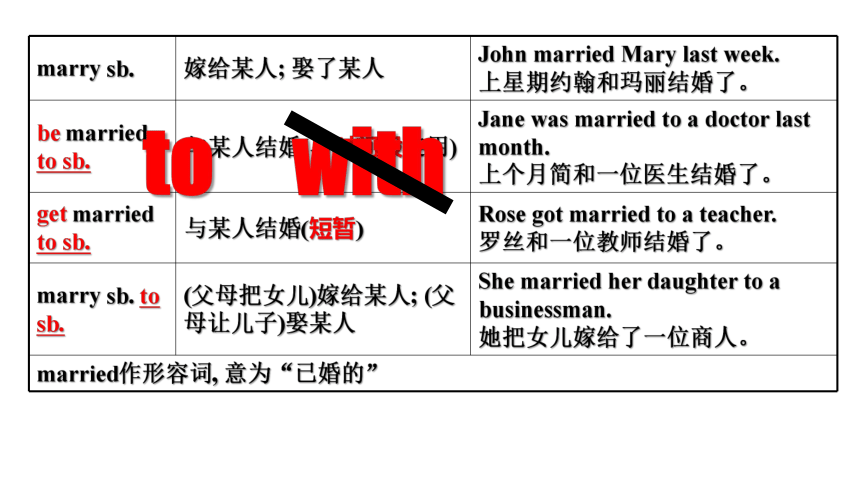
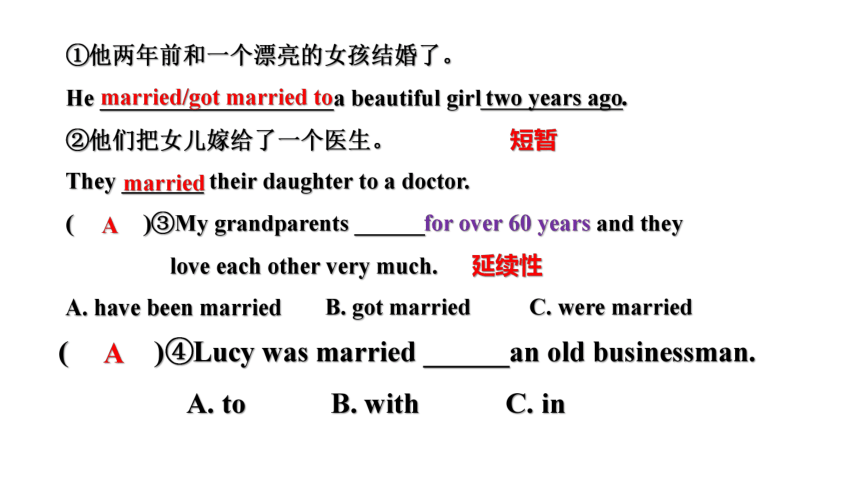
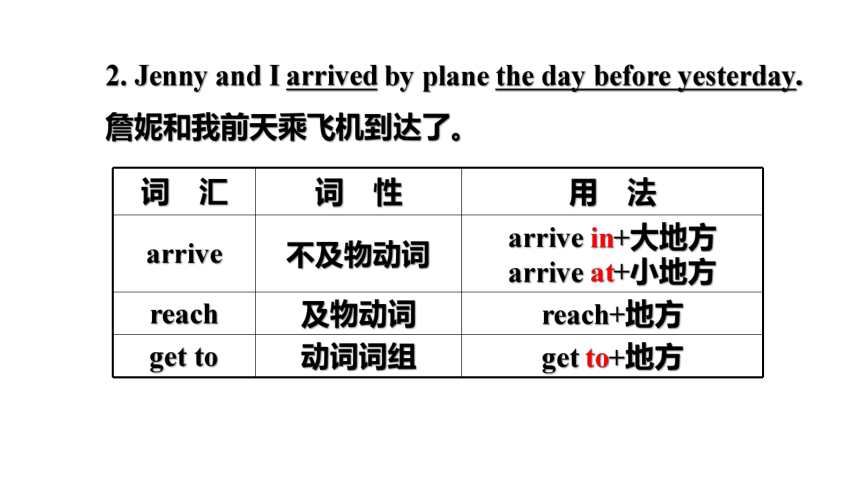
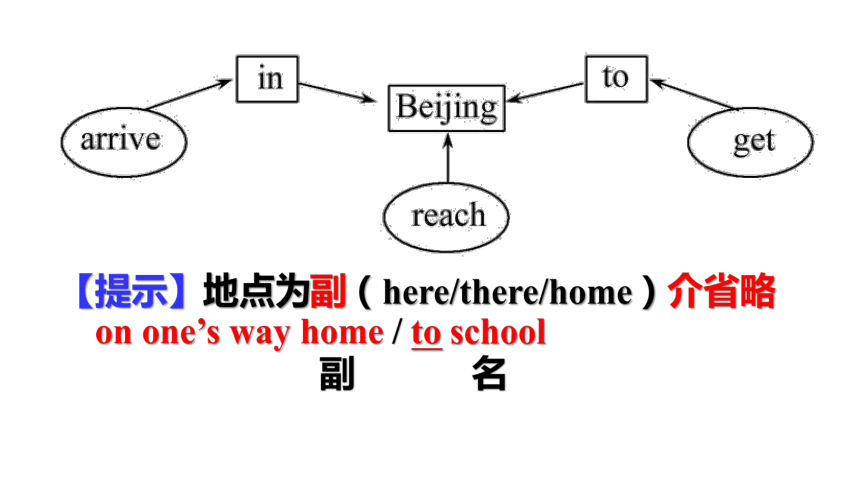
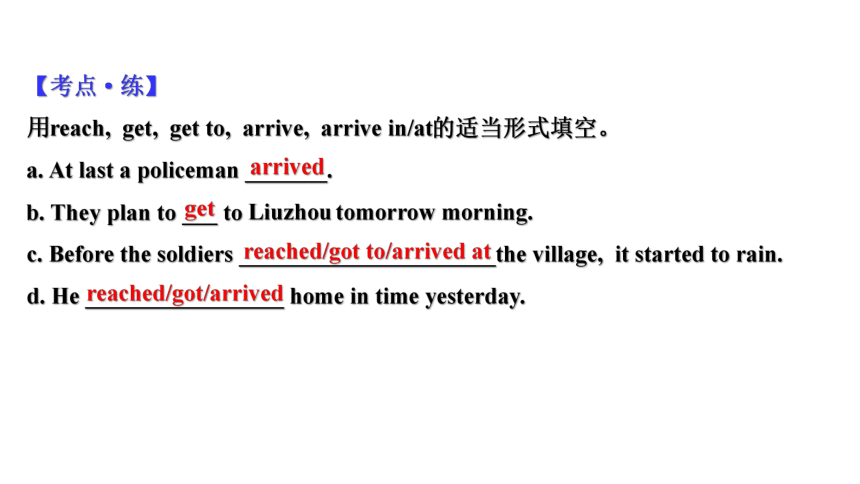
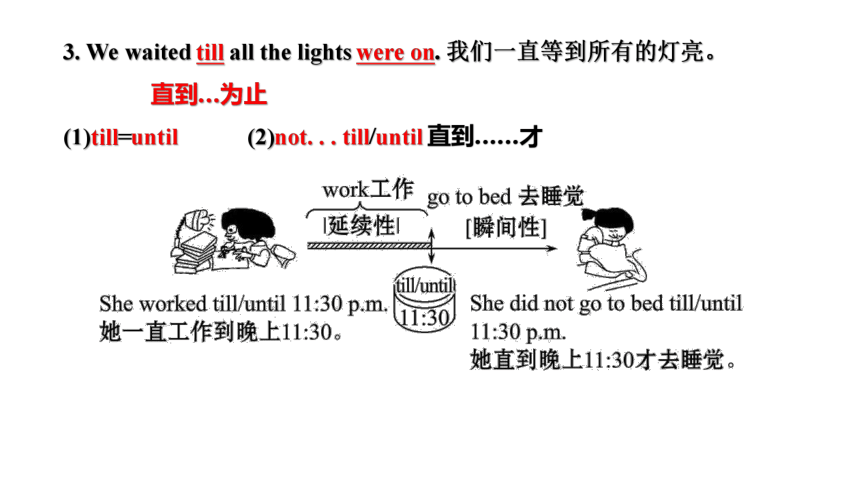
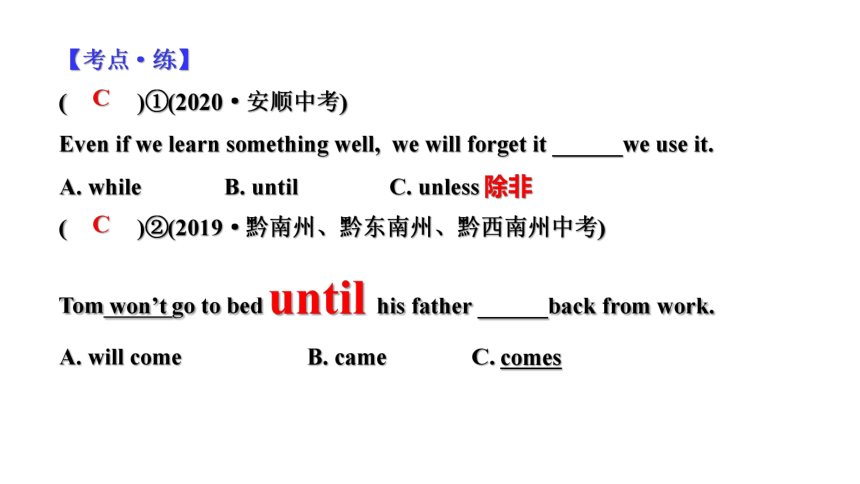
文档简介
(共26张PPT)
七年级下册 Modules 9~12
1. He married in 1582 and had three children.
他1582年结婚, 有3个孩子。
marry sb. 嫁给某人; 娶了某人 John married Mary last week.
上星期约翰和玛丽结婚了。
be married to sb. 与某人结婚(与时间段连用) Jane was married to a doctor last month.
上个月简和一位医生结婚了。
get married to sb. 与某人结婚(短暂) Rose got married to a teacher.
罗丝和一位教师结婚了。
marry sb. to sb. (父母把女儿)嫁给某人; (父母让儿子)娶某人 She married her daughter to a businessman.
她把女儿嫁给了一位商人。
married作形容词, 意为“已婚的” to
with
①他两年前和一个漂亮的女孩结婚了。
He ____________________a beautiful girl two years ago.
②他们把女儿嫁给了一个医生。 短暂
They _______ their daughter to a doctor.
( )③My grandparents ______for over 60 years and they
love each other very much. 延续性
A. have been married B. got married C. were married
married/got married to
married
A
( )④Lucy was married ______an old businessman.
A. to B. with C. in
A
2. Jenny and I arrived by plane the day before yesterday.
詹妮和我前天乘飞机到达了。
词 汇 词 性 用 法
arrive 不及物动词 arrive in+大地方
arrive at+小地方
reach 及物动词 reach+地方
get to 动词词组 get to+地方
【提示】地点为副(here/there/home)介省略
on one’s way home / to school
副 名
【考点·练】
用reach, get, get to, arrive, arrive in/at的适当形式填空。
a. At last a policeman _______.
b. They plan to ___ to Liuzhou tomorrow morning.
c. Before the soldiers ______________________the village, it started to rain.
d. He _________________ home in time yesterday.
arrived
get
reached/got to/arrived at
reached/got/arrived
3. We waited till all the lights were on. 我们一直等到所有的灯亮。
直到…为止
(1)till=until (2)not. . . till/until 直到……才
【考点·练】
( )①(2020·安顺中考)
Even if we learn something well, we will forget it ______we use it.
A. while B. until C. unless 除非
( )②(2019·黔南州、黔东南州、黔西南州中考)
Tom won’t go to bed until his father ______back from work.
A. will come B. came C. comes
C
C
4. I like both. 两个我都喜欢。
同 be、助、情后, 行动前
与not连用时, 表示部分否定
异 (1)both指“两者都”, 反义词为neither
(2)both. . . and. . . 谓语动词用复数
(3)both. . . and. . . 的否定结构为neither. . . nor. . .
all指“三者或三者以上都……”, 反义词为none
①They were all waiting outside the gate.
②Both of us are not doctors. 我们俩并不都是医生。(部分否定)
【考点·练】
( )①(2019·邵阳中考) —Which singer do you like,
Zhang Liangying or Zhou Bichang
—______. I love their songs very much.
A. All B. Neither C. Both
( )②—Do you like rock music or light music
—______. I like pop music.
A. Both B. Either C. Neither
C
C
I love Wangfeng.
( )③Both Lily and Lucy______ to the party yesterday,
but they didn’t come at all.
A. were invited B. was invited C. invited
A
5. William Shakespeare died at the age of fifty-two.
die v. ①不及物动词, 意为“死”, 表示生命的结束, 不能用于被动语态;
②强调动作, 是瞬间动词, 不能与表示一段时间的状语连用
death n. die的名词形式, 意为“死亡” (所有格/形+death)
dead adj. 意为“死的”, 可作表语或定语。(be dead/dead+名词)
dying adj. 表示“即将死去的; 奄奄一息的”(be dying)
(2)die of和die from辨析
die of 因… 而死 死因存在于人体之上或之内 主要指情感、寒冷、饥饿、疾病、衰老等自身的原因
die from 由于… 而死 死因是由环境造成的(外) 主要指事故等方面的外部原因
【考点·练】
( )①His grandmother ______for 6 years. And he still
misses her very much.
A. died B. has died C. has been dead
②用die, dead, death, die of, die from的适当形式填空。
a. His dog _____________for two weeks.
b. The ground was covered with _____ flowers.
C
has been dead
dead
c. His mother’s _____ was a great blow to him.
d. Many villagers ___every year _____ snake bites.
e. The animals ______starvation in the snow.
death
die
from
died of
6. He became a successful actor and began to write plays.
他成为一名成功的演员并开始写剧本。
success n. 成功 have success in. . . 在某方面取得成功
succeed v. 成功 succeed in doing sth. “成功做某事”
successful adj. 成功的 be successful in doing sth. “成功地做某事”
successfully adv. 成功地 修饰动词
( )①The company hopes its product will be ______on the
European market.
A. success B. successful C. successfully
( )②Frederick ______entered the final competition last month.
His hobby has brought him ______.
A. successful; success B. successful; successfully
C. successfully; success
B
C
7. I was so excited! 我是如此兴奋!
I was excited to visit the Great Wall. 我兴致勃勃地游览了长城。
They were excited about the great holiday. 对于精彩的假日, 他们兴奋不已。
excited (adj. ) 感到兴奋的 指人对…… 感到兴奋 主语是“人”
exciting (adj. ) 令人兴奋的; 使人激动的 指事、物本身令人兴奋、激动 修饰“事, 物”
【拓展】
有类似用法(-ing/ -ed)的形容词还有:
interested/interesting bored/boring surprised/surprising tired/tiring moved/moving amazed/amazing relaxed/relaxing worried/worrying
The boy is so________when he
is reading the _________book.
moved
moving
( )①We are all ______at the ______news.
A. exciting; exciting B. excited; exciting C. exciting; excited
( )②The old man was so ______the good news that he couldn’t
say a word.
A. interested in B. excited about C. worried about
③Charlie was too ______ (激动的)to say a word.
B
B
excited
语法点一: 祈使句
考点1 祈使句的句式结构
考点2 祈使句的否定式
考点3 祈使句的反意疑问句
( )1. ______ late again, Bill!
A. Don’t to be B. Don’t be C. Not be
( )2. Kate, ______your homework here tomorrow.
A. bring B. brings C. to bring
( )3. ______wake up your sister, Ben. She needs a good sleep.
A. Don’t B. Doesn’t C. Aren’t
( )4. Please help me carry it, ______
A. will I B. will you C. shall we
B
A
A
B
语法点二: 感叹句和选择疑问句
考点1 how和what引导感叹句的辨析
考点2 选择疑问句的基本形式
考点3 选择疑问句的答语
A.Yes, I do. B.English/Chinese.
Do you like English or Chinese
Ⅰ. 完成下列感叹句
1. _____ exciting news you’ve brought us!
2. _____ scary these tigers are!
3. ________honest boy Tom is!
4. _____ clever boys they are!
5. _____ exciting the speech about“the Belt and Road”(一带一路) was!
What
How
What an
What
How
Ⅱ. 连词成句
1. you, a teacher, or, are, a student
你是个老师还是个学生
___________________________
2. will, leave, London, tomorrow, or, for, when, he, today
他何时动身去伦敦, 今天还是明天
_____________________________________________
3. better, which, do, Chinese, like, subject, math, or, you
你更喜欢哪个学科, 语文还是数学
_____________________________________________
Are you a teacher or a student
When will he leave for London, today or tomorrow
Which subject do you like better, Chinese or math
七年级下册 Modules 9~12
1. He married in 1582 and had three children.
他1582年结婚, 有3个孩子。
marry sb. 嫁给某人; 娶了某人 John married Mary last week.
上星期约翰和玛丽结婚了。
be married to sb. 与某人结婚(与时间段连用) Jane was married to a doctor last month.
上个月简和一位医生结婚了。
get married to sb. 与某人结婚(短暂) Rose got married to a teacher.
罗丝和一位教师结婚了。
marry sb. to sb. (父母把女儿)嫁给某人; (父母让儿子)娶某人 She married her daughter to a businessman.
她把女儿嫁给了一位商人。
married作形容词, 意为“已婚的” to
with
①他两年前和一个漂亮的女孩结婚了。
He ____________________a beautiful girl two years ago.
②他们把女儿嫁给了一个医生。 短暂
They _______ their daughter to a doctor.
( )③My grandparents ______for over 60 years and they
love each other very much. 延续性
A. have been married B. got married C. were married
married/got married to
married
A
( )④Lucy was married ______an old businessman.
A. to B. with C. in
A
2. Jenny and I arrived by plane the day before yesterday.
詹妮和我前天乘飞机到达了。
词 汇 词 性 用 法
arrive 不及物动词 arrive in+大地方
arrive at+小地方
reach 及物动词 reach+地方
get to 动词词组 get to+地方
【提示】地点为副(here/there/home)介省略
on one’s way home / to school
副 名
【考点·练】
用reach, get, get to, arrive, arrive in/at的适当形式填空。
a. At last a policeman _______.
b. They plan to ___ to Liuzhou tomorrow morning.
c. Before the soldiers ______________________the village, it started to rain.
d. He _________________ home in time yesterday.
arrived
get
reached/got to/arrived at
reached/got/arrived
3. We waited till all the lights were on. 我们一直等到所有的灯亮。
直到…为止
(1)till=until (2)not. . . till/until 直到……才
【考点·练】
( )①(2020·安顺中考)
Even if we learn something well, we will forget it ______we use it.
A. while B. until C. unless 除非
( )②(2019·黔南州、黔东南州、黔西南州中考)
Tom won’t go to bed until his father ______back from work.
A. will come B. came C. comes
C
C
4. I like both. 两个我都喜欢。
同 be、助、情后, 行动前
与not连用时, 表示部分否定
异 (1)both指“两者都”, 反义词为neither
(2)both. . . and. . . 谓语动词用复数
(3)both. . . and. . . 的否定结构为neither. . . nor. . .
all指“三者或三者以上都……”, 反义词为none
①They were all waiting outside the gate.
②Both of us are not doctors. 我们俩并不都是医生。(部分否定)
【考点·练】
( )①(2019·邵阳中考) —Which singer do you like,
Zhang Liangying or Zhou Bichang
—______. I love their songs very much.
A. All B. Neither C. Both
( )②—Do you like rock music or light music
—______. I like pop music.
A. Both B. Either C. Neither
C
C
I love Wangfeng.
( )③Both Lily and Lucy______ to the party yesterday,
but they didn’t come at all.
A. were invited B. was invited C. invited
A
5. William Shakespeare died at the age of fifty-two.
die v. ①不及物动词, 意为“死”, 表示生命的结束, 不能用于被动语态;
②强调动作, 是瞬间动词, 不能与表示一段时间的状语连用
death n. die的名词形式, 意为“死亡” (所有格/形+death)
dead adj. 意为“死的”, 可作表语或定语。(be dead/dead+名词)
dying adj. 表示“即将死去的; 奄奄一息的”(be dying)
(2)die of和die from辨析
die of 因… 而死 死因存在于人体之上或之内 主要指情感、寒冷、饥饿、疾病、衰老等自身的原因
die from 由于… 而死 死因是由环境造成的(外) 主要指事故等方面的外部原因
【考点·练】
( )①His grandmother ______for 6 years. And he still
misses her very much.
A. died B. has died C. has been dead
②用die, dead, death, die of, die from的适当形式填空。
a. His dog _____________for two weeks.
b. The ground was covered with _____ flowers.
C
has been dead
dead
c. His mother’s _____ was a great blow to him.
d. Many villagers ___every year _____ snake bites.
e. The animals ______starvation in the snow.
death
die
from
died of
6. He became a successful actor and began to write plays.
他成为一名成功的演员并开始写剧本。
success n. 成功 have success in. . . 在某方面取得成功
succeed v. 成功 succeed in doing sth. “成功做某事”
successful adj. 成功的 be successful in doing sth. “成功地做某事”
successfully adv. 成功地 修饰动词
( )①The company hopes its product will be ______on the
European market.
A. success B. successful C. successfully
( )②Frederick ______entered the final competition last month.
His hobby has brought him ______.
A. successful; success B. successful; successfully
C. successfully; success
B
C
7. I was so excited! 我是如此兴奋!
I was excited to visit the Great Wall. 我兴致勃勃地游览了长城。
They were excited about the great holiday. 对于精彩的假日, 他们兴奋不已。
excited (adj. ) 感到兴奋的 指人对…… 感到兴奋 主语是“人”
exciting (adj. ) 令人兴奋的; 使人激动的 指事、物本身令人兴奋、激动 修饰“事, 物”
【拓展】
有类似用法(-ing/ -ed)的形容词还有:
interested/interesting bored/boring surprised/surprising tired/tiring moved/moving amazed/amazing relaxed/relaxing worried/worrying
The boy is so________when he
is reading the _________book.
moved
moving
( )①We are all ______at the ______news.
A. exciting; exciting B. excited; exciting C. exciting; excited
( )②The old man was so ______the good news that he couldn’t
say a word.
A. interested in B. excited about C. worried about
③Charlie was too ______ (激动的)to say a word.
B
B
excited
语法点一: 祈使句
考点1 祈使句的句式结构
考点2 祈使句的否定式
考点3 祈使句的反意疑问句
( )1. ______ late again, Bill!
A. Don’t to be B. Don’t be C. Not be
( )2. Kate, ______your homework here tomorrow.
A. bring B. brings C. to bring
( )3. ______wake up your sister, Ben. She needs a good sleep.
A. Don’t B. Doesn’t C. Aren’t
( )4. Please help me carry it, ______
A. will I B. will you C. shall we
B
A
A
B
语法点二: 感叹句和选择疑问句
考点1 how和what引导感叹句的辨析
考点2 选择疑问句的基本形式
考点3 选择疑问句的答语
A.Yes, I do. B.English/Chinese.
Do you like English or Chinese
Ⅰ. 完成下列感叹句
1. _____ exciting news you’ve brought us!
2. _____ scary these tigers are!
3. ________honest boy Tom is!
4. _____ clever boys they are!
5. _____ exciting the speech about“the Belt and Road”(一带一路) was!
What
How
What an
What
How
Ⅱ. 连词成句
1. you, a teacher, or, are, a student
你是个老师还是个学生
___________________________
2. will, leave, London, tomorrow, or, for, when, he, today
他何时动身去伦敦, 今天还是明天
_____________________________________________
3. better, which, do, Chinese, like, subject, math, or, you
你更喜欢哪个学科, 语文还是数学
_____________________________________________
Are you a teacher or a student
When will he leave for London, today or tomorrow
Which subject do you like better, Chinese or math
